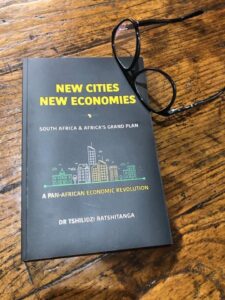New Cities, New Economies is a breathtaking and mind-stimulating read. It is an important and profound read which I recommend to all South Africans, especially those passionate about the reconstruction of this beautiful country through growing the economy for the benefit of everyone.
In this book Tshilidzi Ratshitanga traces how the legacy of unfair spatial planning inherited from the apartheid regime is a major contributor to the existing difficulties facing South Africa today – almost 30 years into democracy.
As a consequence, he proposes a total re-establishment of spatial development through the launch of new cities to propagate new economies. He provides an incisive analysis of conceptions, context and clarifications that underlie the country’s distorted urban development patterns.
The book refreshingly offers a different voice on how urban development, anchored on a new design altogether of cities, could drive economic growth and development.

This outstanding proposal of constructing new cities to enhance new economies will address a host of socio-economic challenges of poverty, racial inequality and high rate of unemployment that are endemic in South Africa under the ANC government.
The book offers an exceptional commentary, more than most of what we have read before on urban development and deserves to be read widely – beyond the African borders.
Ratshitanga asserts that the prepositions made in the book represent a grand plan for the country and the continent at large.
Creating employment opportunities, especially for black South Africans, is critical to address the apartheid legacy of exclusion. Employment opportunities enhance stronger social cohesion, thus this book is a foundational plan to rid South Africa of social ills.
It offers enough information towards understanding how new economies could be built with a particular focus on new cities.
I suggest this well written and profoundly discussed book be prescribed to all South African and African universities, especially the architecture, environment technology, human settlement and urban/town planning departments.
In addition, our national government departments, particularly the human settlement department, have to re-orientate themselves and align their mandates of housing in urban spaces around this refreshing piece of work.
This is because as Ratshitanga argues, the spatial development of apartheid South Africa was highly geographic, thus any endeavour of reconstructing a new prosperous society has to examine spatial deceptions of development.
This book is a bible which will help in re-examining the falsehoods of development in South Africa. Thus, I suggest that all spheres of government, particularly the housing departments, must utilise it to understand more broadly what needs to be done for spatial reconstruction.
Essentially, the thrust of the book is that South Africa and other countries on the continent could harness the spin-offs of urban development through constructing new and modern cities as a strategy to accomplish high levels of economic growth and development.
While there is convergence in the literature about the need to grow the economy to create employment opportunities and reduce levels of poverty, there seems to be no other indicator that could harness growth except investment attraction which we are struggling to get according to Ha-Joon Chang.
This is because of the rand is over-valued and volatile to real interest. Fundamental for Ratshitanga is the creation of new cities to drive new economies. The author is critical of the urban development policies in general, bemoaning that lack of coordination and general lack of centralised planning authority is a problem.
The lack of coordination and authority is not only in the urban development policy but all policies in South Africa.
Central to policy failures is poor and weak coordination with other policies and overly restrictive macro-economic policy.
In addition, there is no greater cooperation and coordination among several ministries engaged in trade and industrial policies. We seem to be directionless in this regard.
In this context, my view is that the state broadly lacks vision, leadership as well as capacity to implement radical transformation in society even within a shortened period.
This lack of vision and leadership in the state mirrors a crisis in the governing ANC as a whole.
How Ratshitanga explains the failure of the BBBEE policy is satisfactory for me that it only privileged the few elite, most of whom are politically connected.
No one can dare challenge me when I say there is no evidence that the BEE policy has been successful because as we all know the majority of South Africans are poor and jobless, thus unable to buy shares and benefit from this policy.
It is my view that this book offers a new start, a paradigm shift centred on the building of new cities. It is a grand plan for both the continent and South Africa, which requires firm, brave and courageous leadership in all levels of society to support its implementation.
In his conclusion, Ratshitanga asks an important question: is our generation ready to govern? My answer is yes, South Africans in their majority are ready for a fundamental shift in all sectors of the economy, and there is no doubt that the status quo which the ANC continues to maintain has proven to be unsustainable.![]()
Written by Tolika Sibiya for City Press
Tolika Sibiya, heads research and policy unit in the SA Youth Council and is a member of the ANC in good standing in ward 57, David Webster branch in Johannesburg



